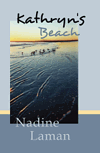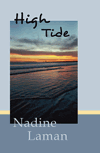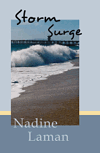One thing that easily gets overlooked in writing is the sensory component. After the storyline is solid, the characters have unique personalities, and all the settings are imaginable for the reader, it is time to go though and make sure that there is sensory input.
We need to feed, not overfeed, the five senses of the reader. Consider it surround sound, but for all the senses. For example, when I write about the beach in Kathryn's Beach, occasionally there is mention of the hard packed wet sand. The dry sand sifts through her fingers, but it isn't just sand, there are shell bits (and assumed other stuff).
This is not the place to wax literary and go over the top with adjectives and adverbs in every sentence. Remember that less is more. Remember that the reader is an intelligent person with stores of experiences to tap. Avoid switching into the telling mode. Hint at things with simple additions, rather than lengthy descriptions. Allow the reader to tap their knowledge from a key descriptive word.
Keep the momentum of the story moving forward, rather than diverting to sidelines to describe things in detail. Not always, of course, but once in a while note a significant change in smell when changing venue. If something is different from what one would expect, for example a quiet bar, then briefly mention it. Or a fishing boat mysteriously floating unattended for days - wouldn't there be the smell of rotting fish from the morning catch on some fateful day? Basically, you don't want to have something obvious missing from the scene.
Visualize your story and once in a while add a small prop to the set. Read your ms aloud to a friend and both of you look for places where sensor items are missing. Avoid overloading the senses and it getting in the way of the storytelling.
Let me know if you try this and how it worked for you.
Tuesday, October 25, 2011
Subscribe to:
Post Comments (Atom)

 When Paul Fenton stops for breakfast in a small town, he gets more than he bargained for in the process.
When Paul Fenton stops for breakfast in a small town, he gets more than he bargained for in the process.
 When two-hundred-year-old human remains are discovered on one of Neptune's moons, Earth's history falls into question.
When two-hundred-year-old human remains are discovered on one of Neptune's moons, Earth's history falls into question.
 Emily's husband persuades her to try thalidomide to ease her symptoms as she is unaware of the devastating effects.
Emily's husband persuades her to try thalidomide to ease her symptoms as she is unaware of the devastating effects.
 Who is the women's shelter bomber? Melissa Ryan suspects that her husband knows.
Who is the women's shelter bomber? Melissa Ryan suspects that her husband knows.
 Further developments with the Wilder family.
Further developments with the Wilder family.
 A hidden past shakes the O'Donovan family to its core
A hidden past shakes the O'Donovan family to its core
 A swirl of emotion and choice, set in Cape Town, South Africa
A swirl of emotion and choice, set in Cape Town, South Africa
 Love is a constant, but it comes at a price.
Love is a constant, but it comes at a price.
 When the road ahead is unclear, sometimes you have to rely on trust.
When the road ahead is unclear, sometimes you have to rely on trust.
 The struggle between good and evil is ages old. It gets all the more complicated when the good guys aren't all good and the bad guys have redeeming qualities.
The struggle between good and evil is ages old. It gets all the more complicated when the good guys aren't all good and the bad guys have redeeming qualities.
 Story of a land mothering two races of people – the light-skinned and the dark-skinned.
Story of a land mothering two races of people – the light-skinned and the dark-skinned.
 A gifted Ukrainian ballerina comes into possession of a mysteriously coded address book.
A gifted Ukrainian ballerina comes into possession of a mysteriously coded address book.
 Six passengers' lives change for better or worse after they arrive in Honiton.
Six passengers' lives change for better or worse after they arrive in Honiton.
 Resilience and love in a harsh and unforgiving age
Resilience and love in a harsh and unforgiving age
 Kathryn's Beach
Kathryn's Beach High Tide
High Tide Storm Surge
Storm Surge
I hadn't consciously thought of the senses when writing, but I think it's there. Probably I can sense atmosphere in my novels, but I wonder if smell and taste are there? Definitely something to think about. Thank you, Nadine.
ReplyDeleteHello Glyn, I think, if you notice it - it is probably too much. Like cooking with spice - if you taste the spice over the food, it was too much. However, it is good to go check your ms before saying it is done -- stick a fork in it.
ReplyDeleteAbsolutely. Think about all the senses too - touch, smell, sight, sound, vision. We all use a different preferred method.
ReplyDeleteI try and introduce a few descriptive sensory pieces, but not too many. I often wonder if I have forgotten to add them and have to go back and add some.
ReplyDeleteI do hate it when a book describes bacon cooking. I drool! :D
Hello both of you. Yes, with the bacon you can tap the knowledge the reader has by simply saying the smell of bacon cooking, and they should get a sensory image. I have been told American bacon is much different from UK bacon...mmmm
ReplyDeleteWhen I was very early teens I read Steinbeck's Grapes of Wrath. As you know the travellers are on their way to the promised land of California are very poor. A lot of the time they lived off flour and water fried. But whenever Steinbeck described that it made me so hungry! Steinbeck was too good at his job.
ReplyDeleteAh yes, Nadine, just noticed your comment. In the UK we have donkey bacon flavoured with marmite.
ReplyDeleteGlyn, That is so bad! You totally distracted me from an educated comment about Steinbeck. There are scenes in The Grapes of Wrath that I sometimes think about and I read that book 30 years ago. Good writing stays with the reader. I love the opening scene in your book, The Doctor, The Plutocrat, and The Mendacious Minister.
ReplyDeleteI suppose my sensory comment about donkey bacon and Marmite proved the point.
ReplyDeleteGlyn,
ReplyDeleteI've never heard of donkey bacon. However, I have tried Marmite - the mention of the stuff is quite a sensory experience for me!